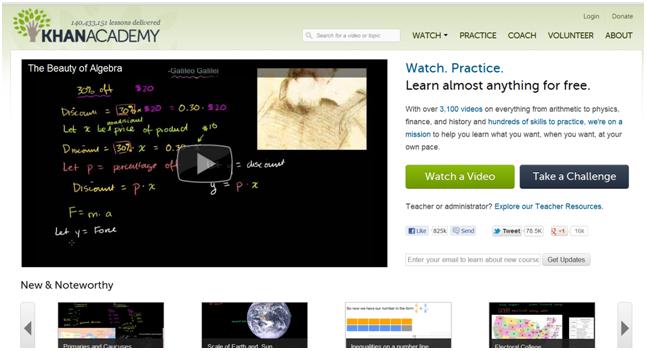With technology growing more and more accessible, online education has recently become a major hit among both students and educators alike. Due to its convenience and user-friendliness, the virtual online classroom has become the preferred method of learning over the traditional classroom setting, even replacing many teachers’ lectures at schools.
Khan Academy, which began as one person’s simple effort to teach algebra to his cousin, now attracts millions of viewers from around the world, and has become the pioneer in offering free world-class education. This nonprofit organization, founded by Salman Khan in 2006, offers more than 3,100 different videos that cover various subjects in all different levels of education.
“Their math and science videos are amazing” said Eric Yoon, a high school student and a frequent visitor of Khan Academy. “There are so many videos and all the videos are pretty detailed. After I finish one video, I feel like I have to watch another.”
Many other academic institutions are following suit and offering their part in this educational revolution. The Massachusetts Institute of Technology (MIT), followed by other leading universities, is now offering more than 400 different free video lectures given by top professors and educators.
The recent surge in online and virtual education, such as Khan Academy, however, has its own disadvantages. Several critics, primarily traditional educators and concerned parents, claim that educational programs over the Internet incentivize students to learn by awarding them with phony badges and certificates, causing many to watch the videos merely to accumulate meaningless points.
“Online learning places too much of a burden on students. Students, even in elementary school, would have to take on the responsibility of managing their own study schedule,” said Jessie Kim, director of AOI College. “Also, it’s so easy for students to be distracted, and it lacks the discipline that education requires.” In addition, the lack of personal interaction normally found in classrooms is just one of the many concerns that some critics have for online classrooms.
Despite the drawbacks to this form of learning, the increasing availability of quality, yet free, courses over the Internet has succeeded in making education more accessible even to those in underprivileged regions. With a few simple clicks, people now have the ability to open up a whole world of knowledge and information, a truly remarkable educational revolution for the 21st century.



oooh i really liked how you balanced the quotes (proponent/critic), but i still wanted to hear more? like EVEN MORE OPINION LOL
this is probably justified since it’s more of an informational article, but people’s opinions are really what drive a story and make it interesting so 🙂
otherwise writing style is coolbeans, and liked how ending tied back to beginning :>
I love Khan Academy! It’s helped me so much in AP Biology, AP Calculus, and AP Physics (and I’m suspected in AP Chemistry this year as well). I actually wrote about Khan Academy for both of my SAT I Reasoning Test essays! It’s a very interesting concept – of teaching through online / video. He’s a great teacher and I can’t wait to see how far this website expands. It is truly a great example of the increasing availability of education in the 21st century.